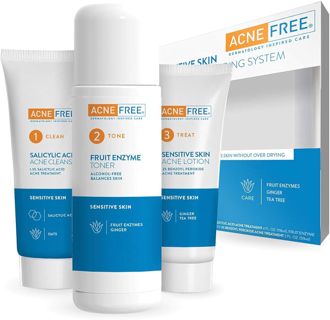The Ultimate Guide to Clearer Skin: Natural Solutions for Acne-Free Living

The Ultimate Guide to Clearer Skin: Natural Solutions for Acne-Free Living
Acne is a common skin condition that affects millions of people around the world, regardless of age, gender, or lifestyle. While it’s most often associated with adolescence, adult acne is on the rise due to stress, hormonal imbalances, and environmental factors. Many sufferers find themselves trying a variety of treatments, from expensive skincare routines to dermatologist visits, all in search of one goal: clearer, healthier skin.
If you’ve been on this journey, you’re not alone. Thankfully, with a better understanding of what causes acne and how to treat it naturally and effectively, you can take significant steps toward achieving blemish-free skin. This guide walks you through the root causes of acne, prevention strategies, natural remedies, and modern treatments, all tailored to help you build a sustainable skincare routine.
Understanding the Root Causes of Acne
Before diving into treatments, it's important to understand what causes acne in the first place. Acne forms when hair follicles become clogged with oil and dead skin cells. This can lead to inflammation, blackheads, whiteheads, or more severe cystic acne.
Several key factors contribute to this process:
Hormonal fluctuations: Particularly common during puberty, menstruation, pregnancy, or stress.
Excess oil production: Oily skin is more prone to clogged pores.
Bacteria: The bacteria Propionibacterium acnes plays a role in inflaming blocked pores.
Diet and lifestyle: Diets high in sugar and dairy may worsen acne in some individuals.
Poor skincare habits: Infrequent cleansing, harsh products, and heavy makeup can contribute to breakouts.
Understanding which of these factors affects you is the first step in creating an effective skincare regimen.
Daily Skincare Habits That Prevent Breakouts
Your skin thrives on consistency. Developing a simple, gentle, and effective skincare routine can dramatically reduce the likelihood of breakouts.
1. Cleanse Twice Daily
Use a gentle, non-comedogenic cleanser that removes oil, dirt, and makeup without stripping the skin. Cleansing in the morning and evening ensures your pores stay clear.
2. Exfoliate Weekly
Exfoliation helps remove dead skin cells, but overdoing it can irritate the skin and worsen acne. Use a mild exfoliant once or twice a week, depending on your skin’s sensitivity.
3. Hydrate and Moisturize
Even oily or acne-prone skin needs moisture. Choose a lightweight, oil-free moisturizer that won’t clog pores. Proper hydration keeps your skin barrier healthy and resilient.
4. Use Sunscreen Daily
UV exposure can worsen acne and lead to dark spots or scarring. Opt for a broad-spectrum SPF 30 or higher sunscreen that’s formulated for acne-prone skin.
Natural Remedies for Clearer Skin
Nature offers several effective solutions that are gentle and chemical-free. While results can vary from person to person, many people find success with the following remedies:
1. Tea Tree Oil
With natural antibacterial properties, tea tree oil can reduce inflammation and combat acne-causing bacteria. Always dilute it with a carrier oil before applying to avoid irritation.
2. Aloe Vera
Aloe vera is known for its soothing and anti-inflammatory properties. Applying pure aloe gel can help reduce redness and swelling associated with acne.
3. Green Tea Extract
Green tea is rich in antioxidants and has been shown to reduce sebum production. Applying cooled green tea or using products infused with green tea can improve skin clarity.
4. Honey and Cinnamon Mask
Both honey and cinnamon have antimicrobial properties. A homemade mask of raw honey and a pinch of cinnamon can act as a spot treatment or full-face mask to reduce acne over time.
Lifestyle Changes to Support Clear Skin
True skin health is a reflection of your overall well-being. Making small but consistent changes to your lifestyle can significantly impact your skin’s appearance.
1. Stay Hydrated
Drinking enough water helps flush out toxins and keeps your skin hydrated from within. Aim for at least 8 glasses a day.
2. Eat a Balanced Diet
Focus on whole foods—fruits, vegetables, lean proteins, and healthy fats. Limiting dairy, sugar, and processed foods can reduce inflammation and potential triggers.
3. Manage Stress
Stress increases cortisol levels, which in turn can lead to more oil production and breakouts. Incorporating mindfulness practices like meditation, yoga, or regular exercise can help.
4. Get Enough Sleep
Poor sleep affects your body’s ability to repair itself and can worsen hormonal imbalances. Aim for 7–9 hours of quality sleep each night.
Modern Skincare Innovations: The Pimple Patch
Modern dermatology and skincare have introduced effective, on-the-go treatments that target acne at the source. One of the most innovative among them is the pimple patch.
A pimple patch is a small, often transparent sticker made from hydrocolloid—a material that draws out impurities and protects the blemish from bacteria and external irritants. These patches are easy to use, discreet, and often work overnight. They not only reduce inflammation but also prevent the urge to pick at your skin, which can cause scarring.
This simple yet powerful tool has gained popularity due to its convenience and effectiveness, especially for those dealing with sudden breakouts before important events or daily routines.
When to See a Dermatologist
If you’ve tried various remedies and your acne persists or worsens, it may be time to consult a dermatologist. They can offer prescription treatments like retinoids, antibiotics, or hormonal therapy tailored to your specific skin type and condition.
Don’t wait until the problem becomes unmanageable. Seeking professional advice early can prevent long-term scarring and emotional stress.
Final Thoughts
Acne may be a common struggle, but it doesn’t have to control your confidence or quality of life. By understanding the root causes, maintaining a healthy skincare routine, trying natural remedies, and using modern solutions like the pimple patch, you can move closer to clear, radiant skin.
Patience and consistency are key—there’s no overnight miracle, but with time and effort, results will follow. Your skin deserves care, not criticism.
0 comments
Be the first to comment!
This post is waiting for your feedback.
Share your thoughts and join the conversation.
